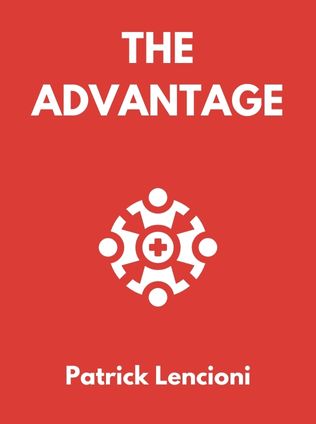
The Advantage
Why Organizational Health Trumps Everything Else In Business
By Patrick Lencioni
Published 03/2012
About the Author
Patrick Lencioni is a renowned author and management consultant, best known for his work on team dynamics and organizational health. He is the founder and president of The Table Group, a firm dedicated to helping organizations become healthier. With over 20 years of experience in writing, field research, and executive consulting, Lencioni has penned several best-selling business fables, including "The Five Dysfunctions of a Team" and "Death by Meeting". "The Advantage" represents his most comprehensive work, focusing on the often-overlooked but crucial aspect of organizational health.
Main Idea
In "The Advantage," Patrick Lencioni argues that organizational health trumps everything else in business. He posits that becoming a healthy organization is the greatest opportunity for improvement and competitive advantage. Organizational health, as Lencioni describes, involves eliminating dysfunction, politics, and confusion within the company. This leads to a more cohesive, focused, and effective organization. He emphasizes that while many leaders focus on becoming smarter through strategy, marketing, and technology, the real untapped potential lies in becoming healthier.
Table of Contents
- The Case for Organizational Health
- The Three Biases
- Smart Versus Healthy
- The Four Disciplines Model
- Discipline 1: Build a Cohesive Leadership Team
- Discipline 2: Create Clarity
- Discipline 3: Overcommunicate Clarity
- Discipline 4: Reinforce Clarity
- The Centrality of Great Meetings
- Seizing the Advantage
The Case for Organizational Health
Lencioni begins by making a compelling case for organizational health, stating, "The single greatest advantage any company can achieve is organizational health." Despite its significance, many leaders overlook it, often viewing it as beneath them or too simplistic. However, Lencioni argues that organizational health is not just about culture but encompasses the entire foundation upon which an organization operates. A healthy organization is free from politics and confusion, characterized by high morale and productivity.
The Three Biases
Lencioni identifies three biases that prevent leaders from embracing organizational health:
- The Sophistication Bias: Many leaders dismiss organizational health as too simple to be a real opportunity for improvement.
- The Adrenaline Bias: Leaders addicted to the rush of daily activities may find it difficult to invest the time needed to build a healthy organization.
- The Quantification Bias: The benefits of organizational health are hard to measure precisely, making it less appealing to analytically-minded leaders.
Overcoming these biases is crucial for leaders who wish to create a healthy organization. As Lencioni puts it, "Organizational health is different. It's not at all touchy-feely, and it's far bigger and more important than mere culture."
Smart Versus Healthy
According to Lencioni, organizations must be both smart and healthy. Smart organizations excel in areas like strategy, marketing, finance, and technology. However, these aspects alone are insufficient for success. Healthy organizations, on the other hand, have minimal politics and confusion, high morale, and low turnover. Lencioni notes, "Being smart is only half the equation. Yet somehow it occupies almost all the time, energy, and attention of most executives."
Sign up for FREE and get access to 1,400+ books summaries.
You May Also Like
The Subtle Art of Not Giving a F*ck
A Counterintuitive Approach to Living a Good Life
By Mark MansonRich Dad Poor Dad
What the Rich Teach Their Kids About Money - That the Poor and Middle Class Do Not!
By Robert T. KiyosakiHow To Win Friends and Influence People
The All-Time Classic Manual Of People Skills
By Dale CarnegieQuiet: The Power of Introverts
The Power of Introverts in a World That Can't Stop Talking
By Susan Cain



















